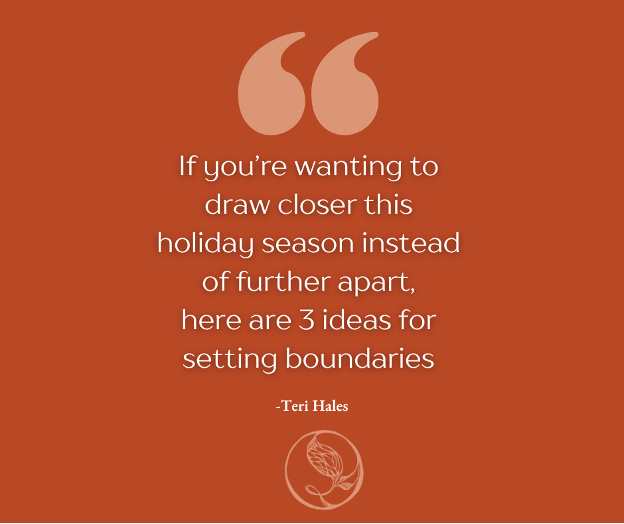Setting Boundaries with Loved Ones
By Teri Hales
Shared With Permission
At this time of year, most of us will have interactions with family members we love dearly but who do and say things that DRIVE US CRAZY.
We’re worried if we say something, we’ll start family drama. And we’re worried that if we don’t say something, we’re going to lose our ever loving minds.
Sometimes when we’re in these positions, it can feel like the only options are to just grin and bear it or stay far, far away from family gatherings. Both options actually create more emotional distance in our relationships.
If you’re wanting to draw closer this holiday season instead of further apart, here are 3 ideas for setting boundaries that are more likely to leave your loved ones feeling warm and fuzzy instead of like you’re giving them an ultimatum.
ADDRESS THE ATTACHMENT:
Boundaries are meant to be invitations into deeper, safer, more loving relationships. They’re the rule book for how to get close to you. Letting someone know that you love and care about them and want to take the relationship deeper can feel really good. You wouldn’t be telling them about your boundaries if you were trying to push them away. You’re inviting them closer by telling them what makes you feel safe.
ONE SPECIFIC STEP AT A TIME:
What is the biggest thing that needs to change for you to feel safer and more respected in the relationship? Get super specific about what it is and communicate ONLY that one thing. When we’ve been biting our tongue for decades, sometimes it’s tempting to get all of the boundaries out at once. That can feel overwhelming to your loved one and may make it so that no changes take place. So, start with the thing that needs to change most. Focus on just that one boundary and recognize when your family member makes efforts to respect it.
RECOGNIZE THE INTENTION:
Most of the time, our loved ones act out of love for us. Even when the action is triggering or annoying as hell, recognize the thought behind the behavior and then redirect to the boundary. Example: “Thank you for being so concerned about me. I love you and value your advice, but I’ve got this under control. I promise I’ll let you know if I need your help.”
Teri Hales is the owner and founder of the “Emancipate Your Mind” Podcast and you can learn more about her work on her website. She is also one of our speakers at the first annual Beyond The Wound summit.
Want to learn more about what healthy relationship dynamics look like? Be sure to sign up today for the Beyond The Wound summit to hear more from experts in religious trauma.

